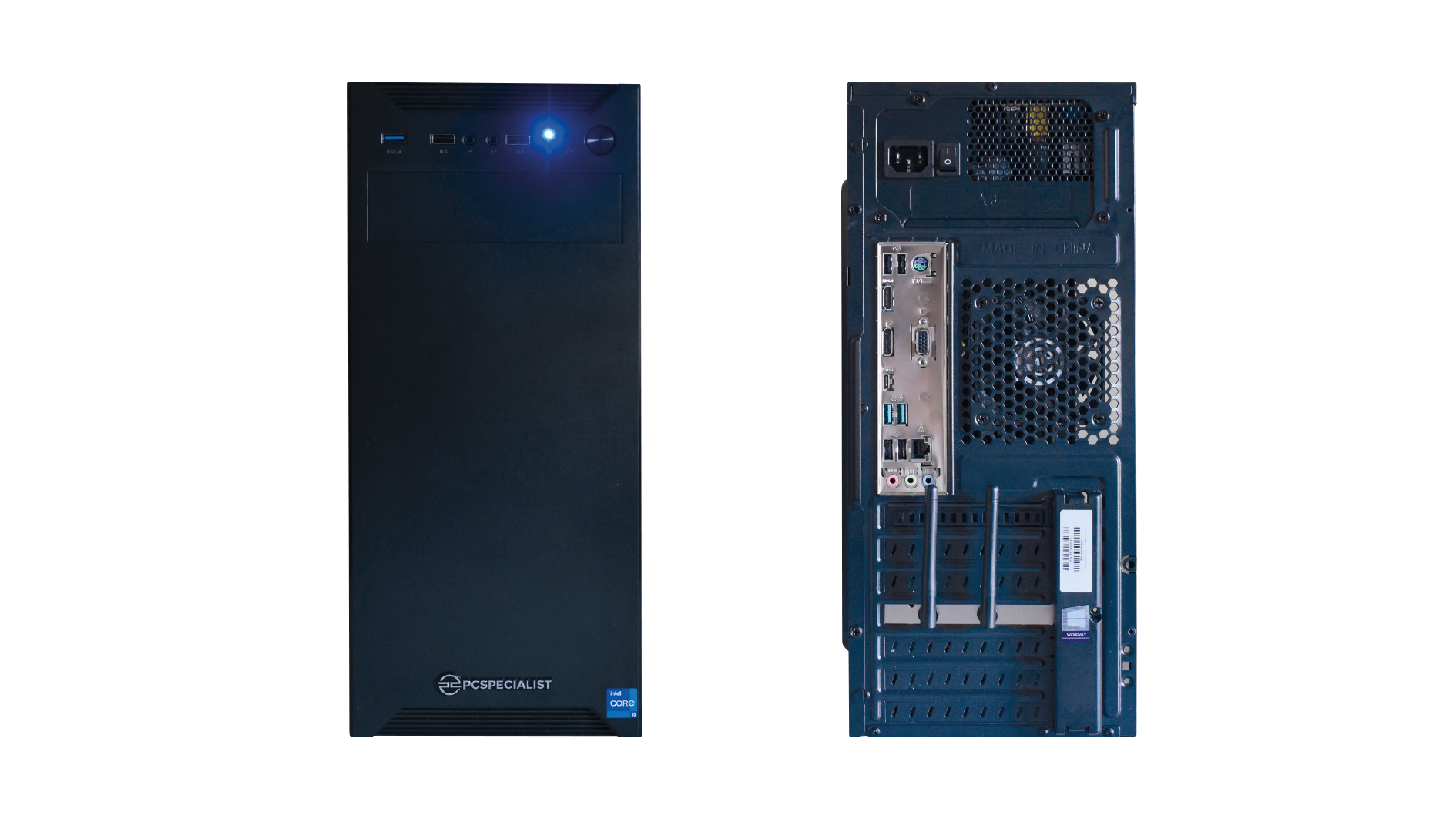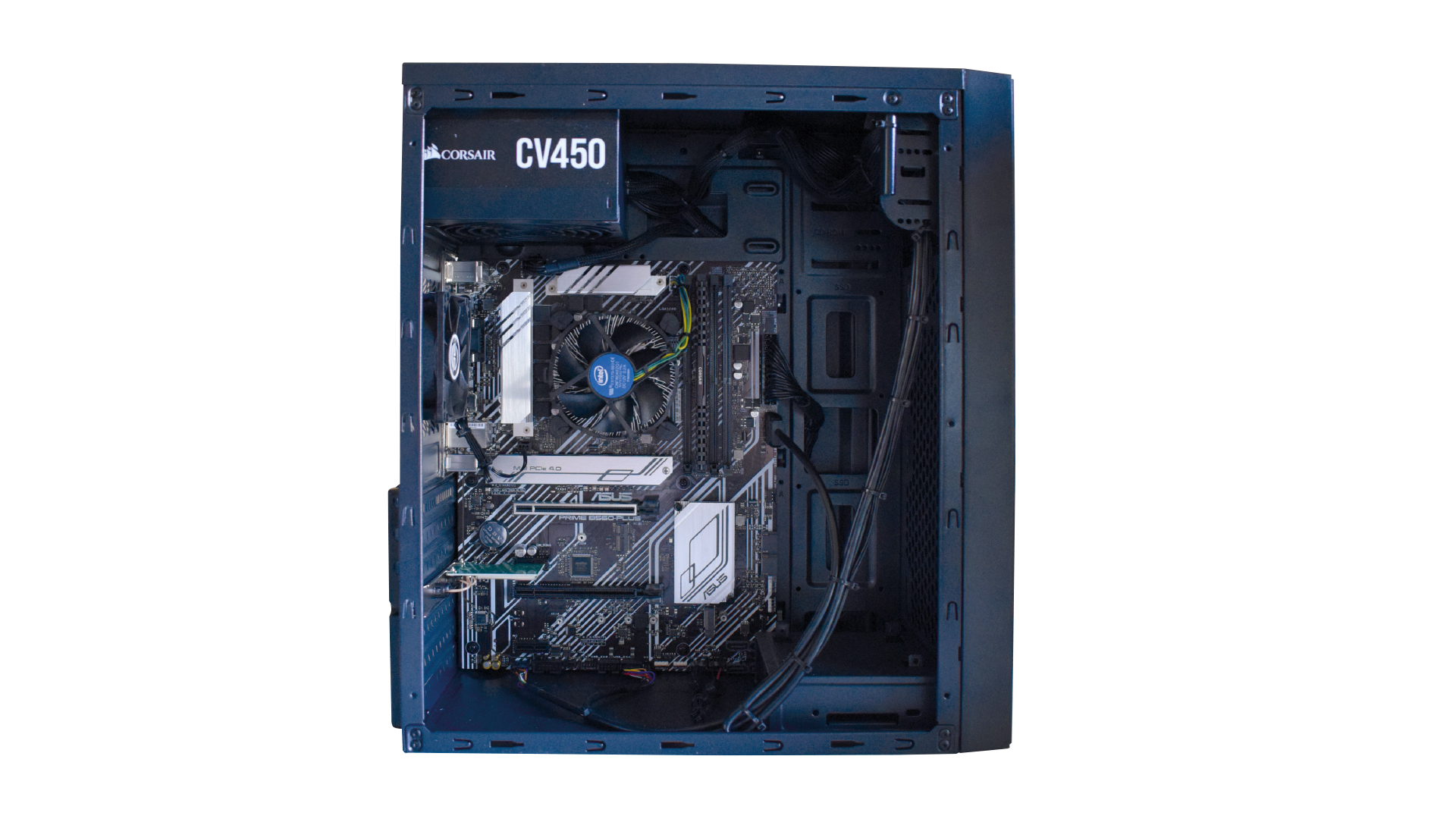PC Specialist Aurora R review: A lion in waiting
A sound foundation if you are looking for a PC on which to build, but set your expectations low for now


-
+
Extremely upgradable
-
+
Solid performance
-
+
Great value
-
-
Large footprint considering the power

We don’t normally comment on the weight of desktop PCs, but after heaving around the more expensive machines we confess to being taken aback by just how light the Aurora R is. You feel like a superhero, such is the ease with which this tower system lifts. There are two main reasons for this disconnect between brain and reality.
First, it’s genuinely light, with a basic chassis with thin metal sides; there’s no tempered glass, nor shedloads of components weighing it down. And second, it’s a full-size tower chassis so it feels like it should be as heavy as other systems from PCSpecialist.
The plus point to having so little inside such a capacious case is the luxury of room. Any upgrades you wish to perform in the future will be easy. More RAM? There are three sockets free, with a single 8GB Corsair Vengeance stick in place. Want to add a graphics card? The Asus Prime B560-Plus’ main x16 PCI Express sits unimpeded in the middle of the board, with two more lying empty – one physical x16 slot, another x1. And if the provided 512GB M.2 NVMe SSD isn’t enough, a second slot lies empty.
The chassis includes one bay for 3.5in drives and two places to screw in 2.5in SSDs, and whilst we see more generous options elsewhere that should be enough. Still, if you had a dream of upgrading to a four-drive RAID array, this isn’t your machine. There’s potential for adding an optical drive, with a cutout at the front under the array of ports: two USB-A 2, one USB-A 3 and two 3.5mm jacks.
The inclusion of a mid-range 450W power supply makes more sense here than it does in a machine with meatier internal components such as a dedicated GPU. The Aurora R idles at 28W and peaks at 205W, so there’s plenty of headroom if and when you do add a graphics card.

This is particularly true when the natural partner for the Intel Core i5-11400 processor that PCSpecialist provides is a mid-range graphics card such as the Nvidia RTX 3060, which is unlikely to need more than 100W. We would argue that a higher-spec card would be a waste, because the CPU would – to put it in basic terms – struggle to keep up.
Not that the i5-11400 is slow. We’re delighted to see that it’s an 11th-generation Core processor, bringing with it plenty of single-core speed. With a boost speed of up to 4.4GHz, it’s capable of excellent performance, even with the basic Intel cooler provided. For instance, it was around 20% faster than the similarly-priced Dell Inspiron Small Desktop 3881 in both the Geekbench 5 and Cinebench R23 single-core tests, and even better in the multi-core Geekbench measurements, besting the dell by a whopping 30%.
It maintained that 30% lead in our own internal benchmarks too, and even held its own in the multicore section of CineBench. In fact, in most measurements, there’s really not much between the Aurora and its much more expensive rivals.
So where does this leave the Aurora R? We’re still not a fan of its size when you consider the power on offer, as it just seems wasteful. But if you’re looking for a base on which to build, it’s great. It’s also quiet in general use – when idling it’s a pussy cat, even if it upgrades to a lion’s roar when faced with challenges. But perhaps that’s the right metaphor for this system: tame today, but with potential to go wild in the future.
PCSpecialist Aurora R specifications
| Processor | 2.6GHz/4.4GHz Intel Core i5-11400 |
| RAM | 8GB Corsair Vengeance 2,400MHz DDR4 |
| Graphics adapter | Intel UHD Graphics 730 |
| Storage | 512GB PCS G930E M.2 NVMe SSD |
| Storage expansion | 1 x M.2 slot, 1 x 3.5in drive bay, 2 x SSD slots |
| Graphics outputs | DisplayPort, HDMI, D-SUB |
| Other ports | 2 x USB-A 3.2, 1 x USB-C 3.2, 6 x USB 2, 1 x USB-A 3, 1x Gigabit Ethernet |
| Wi-Fi | 802.11n (2x2, 2.4GHz only) |
| Bluetooth | N/A |
| Dimensions, mm (WDH) | 180 x 365 x 410mm |
| Operating system | Windows 10 Home |
Get the ITPro daily newsletter
Sign up today and you will receive a free copy of our Future Focus 2025 report - the leading guidance on AI, cybersecurity and other IT challenges as per 700+ senior executives
Tim Danton is editor-in-chief of PC Pro, the UK's biggest selling IT monthly magazine. He specialises in reviews of laptops, desktop PCs and monitors, and is also author of a book called The Computers That Made Britain.
You can contact Tim directly at editor@pcpro.co.uk.
-
 Westcon-Comstor and Vectra AI launch brace of new channel initiatives
Westcon-Comstor and Vectra AI launch brace of new channel initiativesNews Westcon-Comstor and Vectra AI have announced the launch of two new channel growth initiatives focused on the managed security service provider (MSSP) space and AWS Marketplace.
By Daniel Todd Published
-
 Third time lucky? Microsoft finally begins roll-out of controversial Recall feature
Third time lucky? Microsoft finally begins roll-out of controversial Recall featureNews The Windows Recall feature has been plagued by setbacks and backlash from security professionals
By Emma Woollacott Published
-
 The UK government wants quantum technology out of the lab and in the hands of enterprises
The UK government wants quantum technology out of the lab and in the hands of enterprisesNews The UK government has unveiled plans to invest £121 million in quantum computing projects in an effort to drive real-world applications and adoption rates.
By Emma Woollacott Published